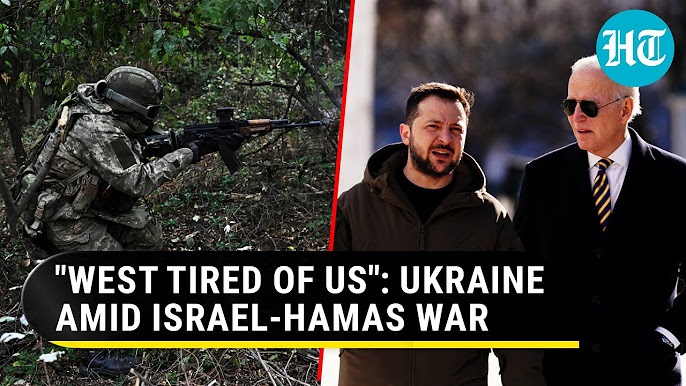
Amid ongoing clashes between Israeli and Hamas forces, the paramilitary group’s ongoing offensive against Israeli forces appears increasingly likely to significantly impact not only global oil prices, but also the outcome of the ongoing Russian-Ukrainian War, notes ‘Military Watch Magazine’.
Israel’s shortages of munitions, and prior moves by the United States to withdraw munitions stored in the Middle Eastern country for donation to Ukraine, has fuelled the already growing opposition in the Washington particularly within the Republican Party to continue supporting the Ukrainian war effort on the scale seen in the last 20 months. Calls have instead been raised to divert arms to Israel.
With Ukrainian flags shown across the Western world in solidarity having begun to be replaced by Israeli ones, from landmarks such as the Brandenburg Gate and Bloomberg Tower to various media sites, Hamas’ offensive has the potential to seriously undermine Kyiv’s ability to continue its war effort. This comes at a time when Ukrainian forces are reeling from months of failed offensives and recent casualties in the high tens of thousands, with widespread predictions previously made that failure in the costly and overwhelmingly Western funded offensive would only further strengthen calls to reevaluate further aid.
While Israel has already received American interceptor missiles for its Iron Dome air defence system, a possible Israeli mass offensive with ground forces into the Hamas ruled Gaza Strip would require many of the same weapons types as those currently being requested by Ukraine.
CNN reports indicate that the Pentagon is instructing defence producers to accelerate the fulfilling of existing Israeli orders, and is “working around the clock… to identify extra stores of munitions around the world and how to move them to Israel quickly.”
Israeli government warnings of a “prolonged” military campaign against Hamas indicate that extensive munitions supplies will be needed, with Tel Aviv having pledged to “obliterate” the militia and political group which would very likely require ground operations.
Hamas’ offensives from October 7 temporarily left Israeli forces in disarray, with the capture of military bases putting large arsenals, including battle tanks, in the militant group’s hands. Footage from Hamas drone strikes has also shown effective use of air power, including to destroy Israeli Merkava IV tanks and other armoured assets.
With hundreds of military vehicles and other assets having already been captured by Hamas, the extent to which loss of forward deployed assets has further limited the Israeli arsenal remains uncertain. The significant possibility that the Hezbollah militia could intervene to prevent or exploit an Israeli ground offensive into Gaza, with its forces boasting capabilities orders of magnitude greater than Hamas’, has further increased pressure on Israeli defences. With Hamas’ leadership and media expressing little opinion on politics beyond its immediate region of operations, it is unlikely that the group intended its operations to have an wider geopolitical impacts or to hinder Ukraine or NATO’s geopolitical positions.
Nevertheless, the timing of the assault coinciding with growing controversies in America surrounding aid to Ukraine means it has the potential to mark a turning point for the Eastern European war effort – one with consequences potentially far outweighing those felt in the Middle East or for Hamas’ own cause.
At a time when Ukraine appears increasingly poorly positioned to achieve its military objectives, diversion of aid to Israel would provide a face saving option for the Western Bloc to reduce its investment in the conflict and press Kyiv to back to the negotiating table, writes MWM.
read more in our Telegram-channel https://t.me/The_International_Affairs

 10:02 18.10.2023 •
10:02 18.10.2023 •






















